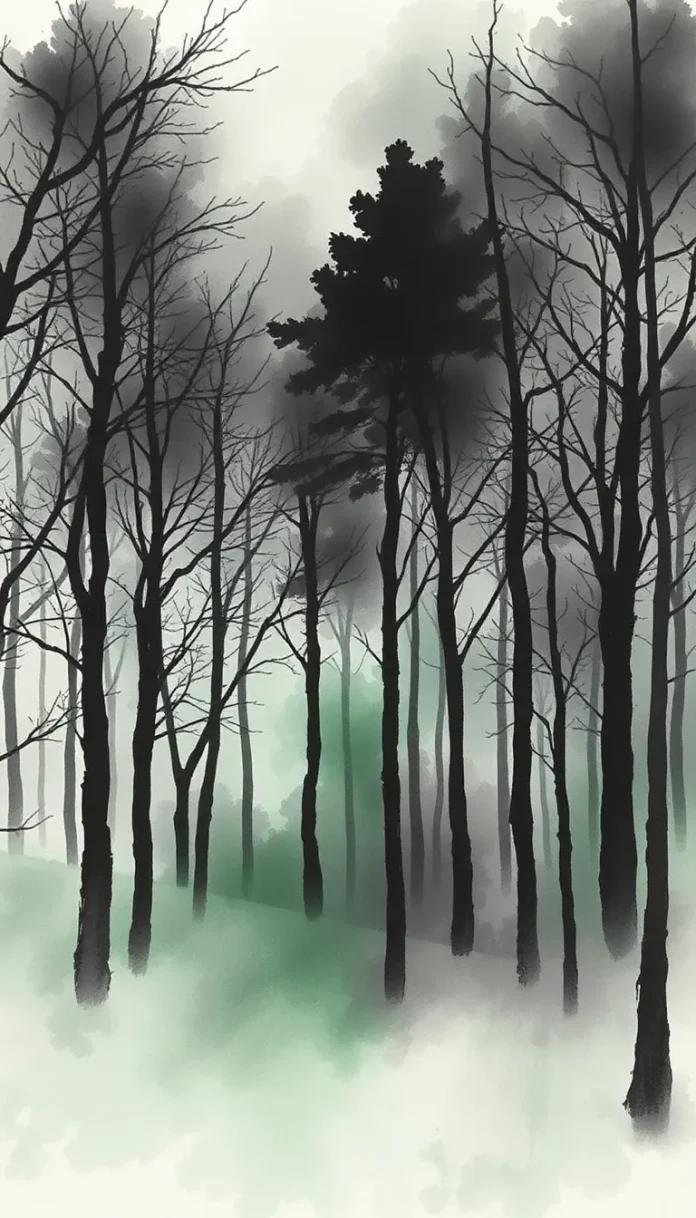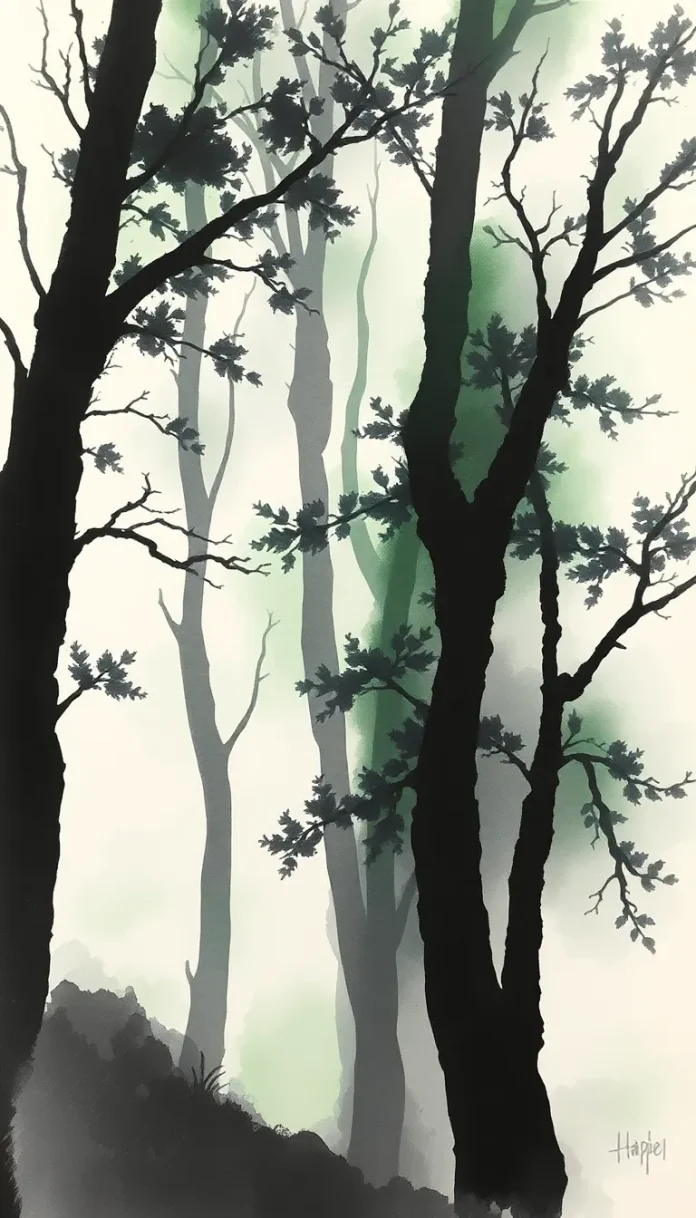The Ballad of Ashes and Echoes
where the moon cuts through fog like a sickle through veils,
there walks one whose shadow outlives every lamp,
a bard clad in tatters, his soul but a cramp
of unsung epics and ink turned to gall—
the poet whom ruin chose to enthrall.
Beneath archways that yawn into caverns of night,
his footsteps resound, yet they echo not right;
for the stones here remember the weight of his tread,
how the curse on his tongue left the heavens unsaid,
how verses he carved into oak turned to rot,
how the stars blinked away from the grief he had wrought.
The curse was no bolt from a wrath-bloated sky,
but a whisper that coiled as he penned lullabies
to the dead who still trembled in unmarked graves.
His stanzas made manifest the silence they craved:
each metaphor birthed but a moth-eaten hymn,
each sonnet a shroud growing ragged and thin.
He wandered the husk of the marketplace square,
where the ghosts of old laughter still poisoned the air,
past windows where mannequins rotted to bone,
their smiles askew in the mildewed unknown.
A river once sapphire now thickened with grime
crawled sluggish beside him, a serpent in time.
Then—
through the haze of the gloaming, a flicker took shape:
a girl by the wharf where the willows did drape
their uncombed tresses in waters turned black.
Her hands cupped a flame that the darkness fought back,
a frail wick of life in that cadaverous scene,
her face half a memory, half a moonbeam.
“Stay back!” she implored, yet her voice held no fear—
a cello’s last note before fading to air.
“Fire dies here when touched by the breath of the lost.”
But he, drawn like ivy to ruins, embossed
his shadow upon her. The flame leaped, then fled.
In the sudden eclipse, all her features turned lead.
“Fool,” she sighed, not unkindly, “what brought you to pry
open this coffin where daylights go to die?”
He knelt, the first gesture he’d made in a year
that wasn’t a verse or a fist against fear.
“Forgive me. My tongue is a knife without sheathe;
I speak, and the world wears the scars underneath.”
She studied his palms, mapped their cracks and their stains,
then pressed her cold brow to his ink-smeared veins.
“Your pulse sings a dirge I’ve heard stones recite
when frost splits their ribs at the nadir of night.
Come, cursed one, walk where the spectres convene—
forgotten, perhaps, we might forge the unseen.”
Through alleys where time had forgotten to flow,
past frescoes of gods whose names no one could know,
they drifted like embers from some long-dead pyre.
He felt the old itch to transmute into lyre
her voice, her grave footsteps, her unflinching gaze—
but feared his words might set her essence ablaze.
She led him to gardens where roses, once bred
to outshine the dawn, now hung limp as the dead,
their petals like parchment where lovers had scrawled
oaths now reduced to a bitter, grey scald.
“Here,” she breathed, “is where hope comes to shrivel.
Speak something true that won’t crumble to drivel.”
His throat filled with thistles, his lips shaped a sound—
not verse, but the whimper of truth long disowned:
“I’ve bartered my days to the void in my chest,
and ache to unmake this unlivable quest.”
The roses stirred faintly, their scent a frail ghost,
and somewhere, a nightingale’s song briefly coast…
Days? Weeks? In that place, hours bled into years,
yet neither spoke of the dread drawing near.
They gathered up fragments—a chipped porcelain dove,
a locket whose face had been scoured by love,
the shell of a clock stripped of gears and of hands—
and built from these wreckage a shrine to lost plans.
But poets, alas, cannot long let things rest;
he yearned to define the undefined in her breast.
One dusk, as she slept ’neath a sycamore’s spleen,
he wrote on its bark with a nail’s jagged gleam:
“O sleeper whose dreams stitch the tatters of fate,
awaken my heart ere it calcifies hate.”
The tree gave a shudder. The girl woke in tears.
“Words, words, always words to compound my fears!
You’d name me your savior? Your muse? Your lament?
I, who am but the sum of what the world has rent?
Flee, fool—for your stanzas have summoned the storm
that will sunder what little of us could stay warm.”
Too late. From the void where the river once teemed,
a wind rose—a thing that howled but never screamed.
It peeled back the scabs of the earth to reveal
the city’s first wound: a chasm of steel
and bone, where the curse had been forged in the deep
by ancestors who’d sold their souls for cheap sleep.
The poet stood frozen, his pen now a stake
through the heart of the peace they’d dared try to make.
The girl faced the maelstrom, her arms spread as wings,
her voice cleaving through the chaos it brings:
“Run! This is the price your cursed art demands—
the razing of all touched by your traitorous hands!”
But he, who’d spent lifetimes in flight from his guilt,
now gripped her wrist—felt her pulse’s last tilt—
and hurled his life’s work into the abyss:
each poem, each sonnet, each scar-ridden kiss
of ink upon paper. The void gave a roar
as pages like ashes rained down on its core.
The earth stilled. The girl wept. “Why would you pay
with the sum of your soul just to buy me one day?”
He smiled—the first true smile he’d worn since a boy—
“Because you were my silence beneath all the noise.”
But curses, like gods, do not barter or bend.
At dawn, when he reached to caress her, his hand
passed through as through mist. She was already gone,
her form but a ripple where light lingered on.
The city, though wounded, still stood in its grave—
his penance to outlive the life he could not save.
Now sometimes, they say, when the fog chokes the piers,
a man recites verse only ravens can hear,
to a shape made of shadow and memory’s ache.
And deep in the earth, the chasm lies awake,
chewing the cud of the words he’d undone—
while far beyond ruin, two echoes dance on.


